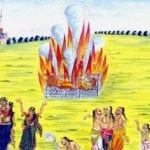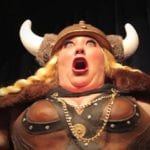 Movies and TV
Movies and TV  Movies and TV
Movies and TV  History
History 10 Things You Never Knew About Presidential First Ladies
 Movies and TV
Movies and TV 10 Zombie Movies That Will Actually Terrify You
 Humans
Humans 10 Times Scientists Were Absolutely Sure… and Absolutely Wrong
 Our World
Our World 10 Pivotal Moments for Life on Earth
 Movies and TV
Movies and TV 10 Most Realistic Medical TV Shows of All Time
 Creepy
Creepy 10 Eerie & Mysterious Ghosts of the Pacific Coast
 Weird Stuff
Weird Stuff 10 Typos That Accidentally Changed History
 History
History 10 Times Trickery Won Battles
 Technology
Technology 10 Awesome Upgrades to Common Household Items
 Movies and TV
Movies and TV 10 Movie Flops That Found Their Way to Cult Classic Status
 History
History 10 Things You Never Knew About Presidential First Ladies
 Movies and TV
Movies and TV 10 Zombie Movies That Will Actually Terrify You
Who's Behind Listverse?

Jamie Frater
Head Editor
Jamie founded Listverse due to an insatiable desire to share fascinating, obscure, and bizarre facts. He has been a guest speaker on numerous national radio and television stations and is a five time published author.
More About Us Humans
Humans 10 Times Scientists Were Absolutely Sure… and Absolutely Wrong
 Our World
Our World 10 Pivotal Moments for Life on Earth
 Movies and TV
Movies and TV 10 Most Realistic Medical TV Shows of All Time
 Creepy
Creepy 10 Eerie & Mysterious Ghosts of the Pacific Coast
 Weird Stuff
Weird Stuff 10 Typos That Accidentally Changed History
 History
History 10 Times Trickery Won Battles
 Technology
Technology 10 Awesome Upgrades to Common Household Items
10 Incredibly Bizarre Origins Of Death From World Mythology
Why do people die? It’s the sort of question that philosophers have pondered for millennia. The world’s mythologies have many answers. Christianity says we die because Eve ate the Fruit of Knowledge, causing God to banish her and Adam from the Garden of Eden (and so also from the Tree of Life). In Greek Mythology, death is the result of the opening of Pandora’s Box. A look at some of the less well known myths on this issue shows that our obsession with our own mortality is matched only by the craziness of our imaginations.
10Coyote’s Animal Rights Protest

According to the Native American Caddo people of East Texas, permanent death was brought into the world by the god Coyote. When man was first created, people lived forever—which caused an inevitable problem with overpopulation. The question of what to do about it fell to the chiefs, who had a meeting with Coyote in attendance. Everyone agreed that death was a workable solution, but that it should be temporary so as to reduce pain and sadness in the world. Coyote alone disagreed, claiming that human death should be permanent, like it was for animals.
Coyote was outvoted, and it was decided that people would take turns being dead. When it was time for people to return to life, their spirits would be called inside a small hut, where they would rise from the dead. Coyote still didn’t like the idea, so when it was time for the first people to return he blocked the entrance to the hut. Depending on the version, Coyote either closed the door or stood in the doorway and scared the spirits away.
Forced to wander, the souls found a road to the spirit land and death became permanent. This didn’t exactly endear Coyote to humanity—he ended up on the run because everyone wanted to kill him. The trickster came to regret his actions when his son was bitten by a snake, and the medicine man told him that there was nothing that could be done to save him. Coyote was angry, but his brother reminded him: “Don’t forget that it was you who wanted it to end this way!”
9Yaramurud’s Really Insistent Mother

Natives of the Andaman Islands in the Indian Ocean say the first person to die was a man named Yaramurud, who lived with his mother and brother. One day he returned from an unsuccessful pig hunt, so his mother brought him some pork from their hut. But when he went to get his knife from the sheath on his back he accidentally cut himself.
His disgusted mother told him: “You are dead now. You had better go away. We do not want you here any more.” She then picked him up, took him into the woods and buried him. But when she returned home, Yaramurud dug himself out and followed behind her. “Mother, I did not die. Why did you bury me?”
“Oh! I thought you had gone,” exclaimed his mother, in one of the most impressive displays of passive-aggression in world mythology. She then tried to bury him two more times, but each time he came back home.
Getting quite fed up, his mother decided to try a different tactic. She took Yaramurud back to the forest, but this time kicked a hollow tree and asked her son to get inside it. When he did so, she asked him to listen to see if he could hear the spirits. When he realized he could, she declared he was now gone forever and went home satisfied. A few days later, Yaramurud returned as a spirit and killed his brother Toau. Death had now been brought into the world, and as a result everyone would die.
8The Humans Who Kept Helping Death

The people that traditionally lived on the shores of Lake Kivu in central Africa tell a tale in which humanity managed to doom itself by being too helpful. God had created mankind to be immortal but Death wandered the land trying to start a fight with humans. To stop Death from getting his hands on people, God spent his time chasing Death around and keeping him away.
The God in this story isn’t omnipresent and had to go away for a few days. Death took the opportunity to kill an old woman. When the old woman’s grave began to heave her daughter-in-law poured boiling water all over it, declaring she should stay dead. It’s not clear if this was a metaphysical declaration or if the two women just really didn’t get on.
God wasn’t exactly pleased to find out about all this, and Death did what anyone should do when being chased by an angry world-creating deity—he asked an old woman to let him hide up her skirt. He promised her a reward, so she agreed. But when God found them, Death sneakily entered the old woman’s body.
God was already annoyed with the woman and decided that, since she was old anyway, it would be worth killing her to be able to get at Death. But Death slipped through the deity’s fingers and got away again. Death then found a young girl, who agreed to let him hide inside her belly. When God came upon them he threw his hands up, sighed, and decided we weren’t worth keeping immortal if we were just going to make it difficult for him. God gave up and let Death do whatever he liked (sweet-talking his way inside of women, apparently). Now Death is free to claim all of us.
7Animal Spirits Versus The Moon

The aboriginal people of Australia have a number of different stories about how we ended up with death, and a lot of them feature the moon as a major protagonist. In the simplest version of the tale, spirits were creating the world during what is known as the Dreamtime, when Moon told Parrot Fish (or possibly Dugong) to be like him and be reborn each month. Yet the animal wanted death to be permanent, and so it was for humans as well.
In a similar version, Possum beats Moon with a stick, so Moon retaliates with a spear. “All the people who come after me, future generations, when they die they’ll die forever,” said Possum. If Moon had spoken first, we’d be reborn, but it was the Possum’s words that stuck. In yet another version, Moon had a dispute with Wallaby. They were discussing whose urine their wives should drink (we’ve all been there), but both wives chose to drink Wallaby’s. If they’d only drunk Moon’s urine, we’d be reborn when we die.
6Alatangana’s Debt To Sa

For the Kono people of Guinea, the origin of death is very closely linked to the origin of life. Before the Earth existed, there was the god Sa, who lived with his wife and daughter in a vast expanse of dark mud. One day the god Alatangana happened upon them and was outraged by the conditions. Alatangana solidified the mud, creating the Earth, and covered it in plants. Sa agreed the new place was better and asked Alatangana to stay as a guest. Alatangana agreed and eventually fell in love with Sa’s daughter and asked if he could take her as a wife.
Sa apparently had higher standards for his daughter than someone who had just created an entire world, so he refused the request. Alatangana, unimpressed, seduced Sa’s daughter anyway. The two eloped to the other end of the planet and had 14 children—three boys with dark skin and four with light skin, and girls to match. These were the parents of the human race. Yet there was still no light in the world, so everyone was forced to live in the dark.
Alatangana wasn’t sure how to create light, so he sent two birds to ask Sa if he knew (the younger god was scared to confront his father-in-law directly). Sa told the birds that they simply needed to sing two special songs and light would come. When the birds got back, Alatangana thought this was nonsense and threatened to kill his messengers, but when the birds sang the dawn did indeed come.
Meanwhile, Sa had realized he’d given up his daughter and the secret of light and only gotten a single planet in return, putting Alatangana in his debt. In payment, Sa demanded to be able to take the souls of Alatangana’s descendants whenever he wanted, and that is the reason we all die. It’s unclear who’s taking the souls of plants, but since they used to be able to survive 14 human pregnancies without any light, they must have offended somebody.
5A Sleepy Dog

The Luba people of central Africa have a creator god known as Kalumba. He forged the sun and the land, and created a walking creature from a stick. That creature bore twins, a male and a female, who were the first humans. Together they had their own set of twins, who went on to populate the world. At that time Kalumba was keeping both Life and Death tied to a pole. Yet Kalumba knew they would both try to get free and reach the people.
Rather than guarding Life and Death himself, Kalumba enlisted the help of a dog and a goat, creatively named Dog and Goat. He told the animals to allow Life to pass, but to stop Death. Unfortunately, the animals didn’t get on and got into an argument when Goat said that Dog would fall asleep.
Insisting he had too much energy to fall asleep, Dog started jumping around. Goat, annoyed and offended, stormed off home. You’ve probably guessed by now that Dog fell asleep, allowing Death to sneak past. When Goat found out what happened he cursed at Dog, then stayed up all night to demonstrate how it should be done. The relationship between the two never improved.
4A Hyena Severing The Rope To Heaven

The Nuer people, from the border of South Sudan and Ethiopia, revere a god named Kwoth. Like the Abrahamic God, Kwoth is said to be omnipresent while also residing in Heaven, which is considered to be in the sky. Among many other things, Kwoth is said to have cursed Europeans with light skin as punishment for an act of mother and son incest between their ancestors.
At one time there was a rope between Heaven and Earth. When people got old they climbed up to see Kwoth in Heaven. While there they became youthful again and were able to climb back down and continue their lives. One day, a mischievous hyena climbed the rope (if there’s one thing these stories make clear, it’s that animals have really screwed up the whole immortality thing for us). Angry, Kwoth forbade the hyena from ever returning to Earth.
The hyena was having none of it and one night he escaped, cutting the rope behind him so that he couldn’t be pursued. This meant there was no longer any way for people to travel to Heaven, cursing them to age until they died.
3An Ill-Advised Affair
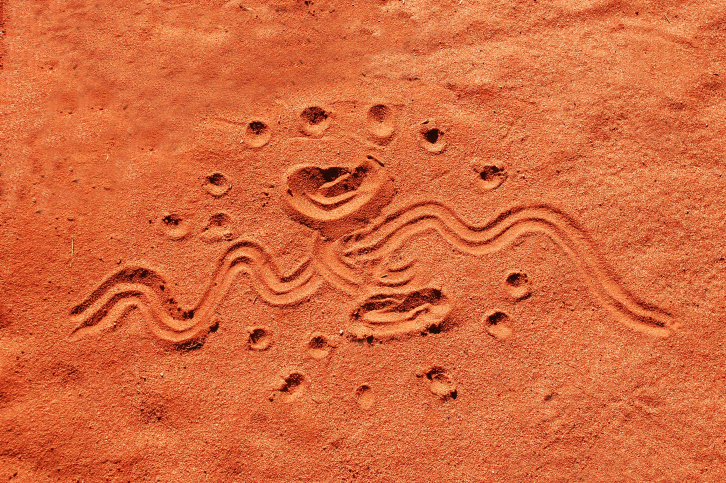
The Tiwi people of Northern Australia have a cautionary tale about lust as their explanation of mortality. In their Dreamtime creation myth, the first man on Earth was named Purukapali, and he was immortal. He had a wife called Bima and three children. He also had a brother named Tapara, whose relationship with Bima was a little bit too intimate for a brother-in-law.
One day, Bima and Tapara were so caught up in their lustful affair that Bima completely forgot about her youngest child. Depending on which version of the story you hear, the baby either starved, or burnt to death under the midday sun. When Purukapali found out, he was a teeny bit angry.
Purukapali beat his brother, covering him in scars and bruises and forcing him to flee. In one version he became the moon, in another the moon was already there and Tapara just went to live there. Either way, the craters on the moon are the marks left behind by Purukapali’s attack.
Bima fled, chased by some angry pelicans, and became a bird. She still flies around, giving cries of anguish over her neglect. Purukapali took up the body of his dead infant and, in his rage, declared that all men would die from now on. He then walked into the sea, never to be seen again.
2A Forgetful Cat
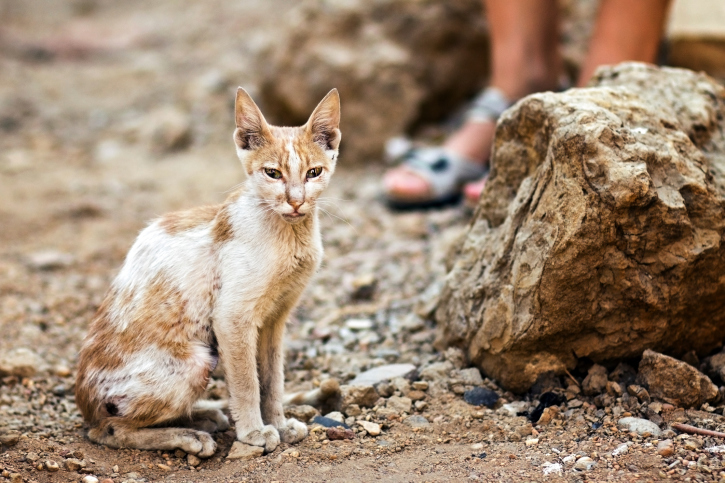
A myth from the West African country of Liberia involves the god Sno-Nyosa. After he created the world, he sent his four sons from Heaven to visit the Earth. When he asked his sons to return, they told him they were quite happy on Earth, and the Earth itself was keen on keeping them. But Sno-Nyosa, being an omnipotent world-creator, wasn’t going to let anyone else have their way.
Sno-Nyosa called the souls of his sons back to Heaven, but left their lifeless bodies with the Earth. He has continued to do this with all people. However, mankind didn’t simply accept this state of affairs. They wanted to go back to a time without suffering and illness and eventually discovered that a medicine-man possessed a potion that would cure the sick and bring the dead back to life.
Since getting hold of this potion would be the most important task in mankind’s history, they probably tried to assign it to a creature with a reputation for being loyal and reliable, rather than fickle and aloof. Apparently they couldn’t find one, because they sent a cat. On his way back with the potion, the cat put it down on a tree stump to take a bath in a river. When he was all washed, he forgot about the potion and sauntered back home.
When the cat returned without the potion, the people were very angry. The cat went to look for the medicine, without luck, so went back to the medicine-man, who was also annoyed with the cat and refused to help. It was a case of tough luck for humanity—the cat had left the potion with trees, and now they would get the benefit of eternal life. Humans were destined to die. Maybe that’s what cats are trying to make up for with all those dead mice they bring us?
1An Incident With A Vagina
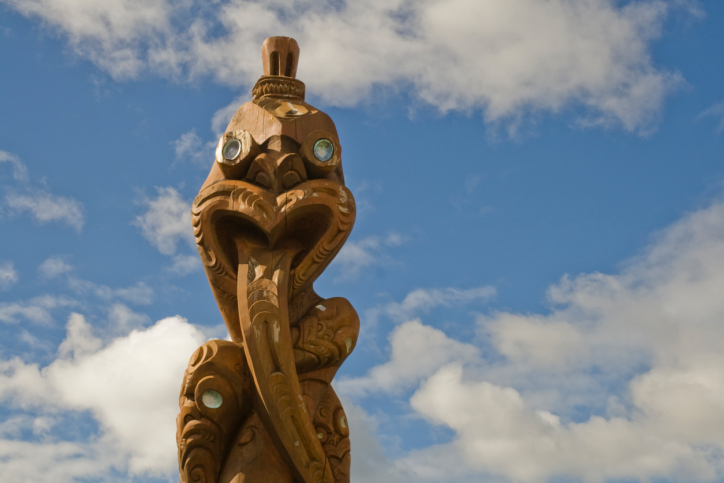
Hine-nui-te-po is a Maori goddess, who looks after souls in the underworld. Her father was Tane, one of the first gods to walk the Earth. Tane crafted a woman out of red clay, and together they conceived a daughter, who was Hine. Tane took his daughter as a wife, without telling her he was her father. When she became curious and figured it out, she was so ashamed she fled to the underworld. Tane chased her, but she told him to return, adding: “Raise our children. Let me remain here to gather them in.”
Their children were the first humans. Yet our shot at immortality wasn’t lost—there was one way to regain it. A hero would need to kill our ancestral goddess, and the only way would be to pass through Hine-nui-te-po in the reverse of childbirth. That means entering through her vagina and leaving through her mouth (we’ll have to assume that anatomy is slightly different for a goddess).
The brave (or kinky) young fellow that volunteered to undertake this arduous task was named Maui. He set off with his companions, a selection of small birds, who he asked to be quiet while he completed his quest. “If I enter the body of this old woman, do not laugh at me. But wait until I reappear again from her mouth. Then you may laugh all you wish.”
Some sources suggest he entered in human form (like this sculpture, which suggests the whole thing was a bad idea from the start). In other stories Maui transforms himself into a worm before attempting his journey. Why the goddess of the underworld sleeps naked with her legs spread apart is not explained.
Sadly for Maui, the sight of him half sticking out of a woman’s private parts was just too hilarious for the birds he brought along. They began laughing, which woke up Hine. She noticed the fact there was a worm (or an entire human head) inside of her, and crushed him between her thighs. Maui was snapped in two, and mankind’s chance for immortality was lost.
Alan will never trust an animal again for as long as he lives, which apparently won’t be forever.
